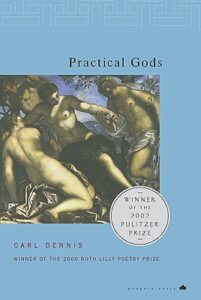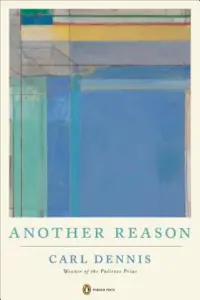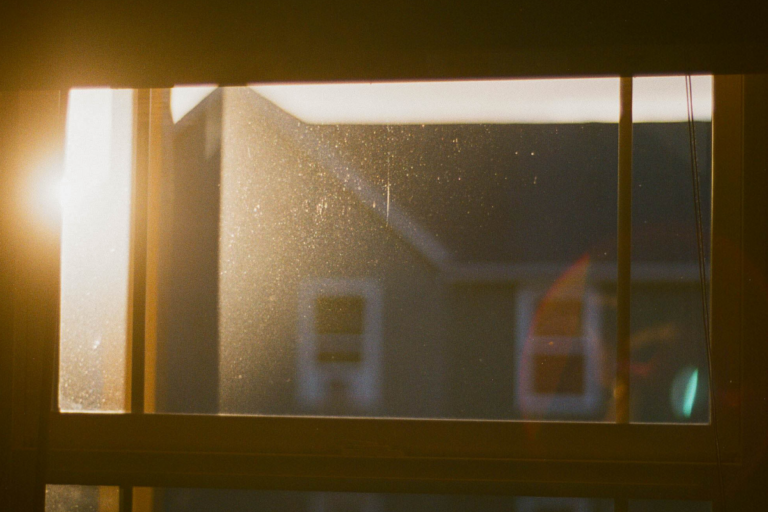Carl Dennis
Breath
A fragile and wondrous technology that we all possess, the human breath powers any number of things in our lives — speeches, feats of music, athleticism, and more. Carl Dennis’s powerful and meditative poem “Breath” calls on us to take a moment, give our breath our full attention, and celebrate it.
We’re pleased to offer Carl Dennis’s poem, and invite you to read Pádraig’s weekly Poetry Unbound Substack, read the Poetry Unbound book, or listen back to all our episodes.

Image by Annisa Hale/ Film processed by Moody's Film Lab, © All Rights Reserved.
Guest

Carl Dennis is the author of 13 works of poetry, including Earthborn (Penguin Books/Penguin Random House, 2022), as well as a collection of essays called Poetry as Persuasion (University of Georgia Press, 2001). In 2000, he received the Ruth Lilly Poetry Prize for his contribution to American poetry. His 2001 collection Practical Gods (Penguin Books/Penguin Random House) won the Pulitzer Prize. He lives in Buffalo, New York. Image by Mary Richert.
Transcript
Transcription by Alletta Cooper
Pádraig Ó Tuama: My name is Pádraig Ó Tuama and I worked in conflict resolution for a long time. I remember one time, years ago, somebody said, you know, “Conflict resolution lasts for a moment. And then you go back and you do the dishes or you get on the boring bus to the boring job or you go to the thing you don’t want to do.” And what he was saying was so interesting because it said that sometimes there’s these elevated moments that remind you, “This is what life can be,” and then ordinary stuff continues on. But it’s not like those things are worthless. Those things are in conversation in some kind of concert with the ordinary moments, we can see how an elevated moment can have a message for the everyday moment, too.
[music: “Praise the Rain” by Gautam Srikishan]
“Breath” by Carl Dennis
“It’s humbling to dwell on the need
For taking in a mouthful of air
A dozen times a minute
Whether we want to or not,
Whether the air available blows in
From a mountain meadow or from a swamp.
“Still, I’m proud of the deep breaths
That our featured speaker tonight is taking
While she waits to be introduced. Her voice
Mustn’t quaver as she exposes the lies
Told about our water and soil and air,
The claims they’re as clean as they’ve ever been.
“Though she doesn’t believe her words
Will be wafted around the world
On an irresistible tide of spirit,
At least she believes that her audience
Will try to give them a fair hearing
If she can deliver them with authority.
“When I think of what can be done
With a single breath, I think of the soloist
In the old recording I own, on seventy-eighths,
Of Mozart’s oboe concerto, of his sudden
Intake of breath at a silent beat
To fill his lungs for a soaring passage.
“I hope our speaker’s faith this evening
In the worth of her contribution
Is akin to the faith of the musician
As he sends his theme, finely phrased,
Out through the double reeds.
“May it meet with good luck
On its unpredictable journey,
Riding farther than many suppose
A theme can ride on a puff of air.”
[music: “Memoriam” by Gautam Srikishan]
You can argue that every poem has a relationship with time, but this one has a very particular relationship with time right from the opening. “It’s humbling to dwell on the need / For taking in a mouthful of air / A dozen times a minute.” So immediately we’re thinking about a minute, and then a dozen times within that minute: five seconds. So time is being slowed down. We’re brought into a few moments of thinking of this speaker who’s breathing while she’s about to be introduced, and then brought in, later, to a soloist who takes one sharp intake of breath just before an oboe solo in a concerto by Mozart. I’m becoming self-conscious of my breathing even now — that each time I breathe in, that’s the space within which this poem occurs. That the poet, Carl Dennis, was looking at someone breathing, was thinking about the breath of the soloist, was thinking about his own breath and the breath of everyone in the audience, and thinking about how breath is at the heart of all living things. And the quality of breath and the quality of what we breathe in. And perhaps, even the quality of what we breathe out — truth, music, or, on the other side of that lies and untruth. So the question in the poem is the small intake of breath and how that is at the heart of the entirety of the project of being alive.
[music: “Daybreak” by Gautam Srikishan]
Lots of contemporary poetry these days doesn’t have a capital letter at the beginning of every line. That’s a fairly new way to write poetry. For a very long time, whether or not the sentence was broken and running over, the entirety of the left-hand column of a poem would be a succession of capital letters. But some poets do stick to this convention. Tracy K. Smith does it a lot. And in this poem, Carl Dennis also does. Using a capital letter at the beginning of every single line in a poem has a fancy title — majusculation. And there’s something interesting in looking at a poem that keeps that, because what you can do is to look down and see it as 33 statements that can exist totally separately from each other, that aren’t lines that flow into lines that flow into lines, that really are just 33 statements. And some of them really stand out when you look at them as a small comprehensive unit that just goes across one line. The opening one, “It’s humbling to dwell on the need.” Stop right there, there isn’t a full stop there, but the poem, I think, invites us to think about that little fragment. Later on, “Though she doesn’t believe her words” and then later again “At least she believes that her audience.” Further on, “When I think of what can be done,” “Intake of breath at a silent beat,” “Out through the double reeds,” “A theme can ride on a puff of air.”
You can do this with any poem, you can read and just think, “Does a line stand out by itself quite apart from what comes before and what comes after?” But poems that use majusculation really do invite the eye to think about each line as a separate unit.
Another thing that Carl Dennis does in this poem is that most of the stanzas are just one sentence spread out over six lines. I don’t have big enough lungs — maybe it’s my asthma or maybe nobody does — to take a breath in and to try to say the full stanza in that. And so the poem about breath asks you, if you’re reading it aloud, to pay attention to breath. “Where am I going to take a breath while I breathe out this poem? While I speak this poem?” It asks the reader of the poem to be in a self-conscious, beautifully self-conscious relationship with the very theme that the poem is circling and considering.
[music: “Family Tree” by Gautam Srikishan]
This poem is so much about breath and links breath with a message and links that message with truth and links that truth with music. And you can trace through the poem and see all of these notations, these musical references that are throughout the poem. “soloist,” “recording,” “seventy-eights,” obviously “Mozart’s oboe concerto,” “soaring passage,” and “theme” and “phrased,” “double reads,” and then “puff of air.” These references to some of the technicalities of playing an instrument, some of the technicalities of speaking in public, some of the technicalities of just staying alive — they’re all linked. And I think what he’s proposing is that music and truth are necessary, and require our time, require our attention, too, and can last, can “ride on a puff of air.” Nobody plays an oboe solo for Mozart’s concerto without years of practice in advance, and nobody stands up to deliver a lecture filled with information and learning and study without years of preparation and learning and study in advance. And those two things seem to be held together. The quality of artistry and time and knowledge and importance in someone who’s delivering a solo, whether that solo is on an oboe, or whether that solo is on a speech.
What’s interesting in the poem is that Carl Denis gives very little time — just a few lines really — to speak about the counter voice, the voice that doesn’t seem like music. “The lies / Told about our water and soil and air, / The claims they’re as clean as they’ve ever been.” That’s the only reference to what it is that the speaker is speaking against and giving a corrective to. Her music is something that he is suggesting. The music of her content, the music of her breath, and the music of the deep study of her life, that’s much more important and is deserving of much more time in the body of the poem as well as in the listenership, as Carl Dennis puts it across in this poem.
[music: “Toothless Slope” by Blue Dot Sessions]
There’s something about authority in the poem. Carl Dennis, as the speaker in the poem, seems to trust and return to a recording on a seventy-eight record of Mozart’s concerto. And then, another place of authority in the poem, are the words that are coming from this speaker’s mouth, what she’s saying, her insight, what she’s alerting people to. This poem has a sense of how it is that communities can organize themselves around someone with skill, with knowledge, with information that’s necessary. Sometimes that information that’s necessary might be about how beautiful it can be to be surrounded by music, and also how demanding it can be to be alert to some information about the quality of air and water and soil that demands our attention and that is worthwhile pursuing and staying with for as long as you would a beautiful piece of music. Returning to it, not drowning it out in the cacophony of lies or the cacophony of, “Let’s everybody have their opinion.” He is amplifying how it is that groups of people can come together and listen to something that’s pertinent and necessary and pay attention to it, to give it authority, and then to respond in kind.
[music: “Creatures of Myth” by Gautam Srikishan]
“Breath” by Carl Dennis
“It’s humbling to dwell on the need
For taking in a mouthful of air
A dozen times a minute
Whether we want to or not,
Whether the air available blows in
From a mountain meadow or from a swamp.
“Still, I’m proud of the deep breaths
That our featured speaker tonight is taking
While she waits to be introduced. Her voice
Mustn’t quaver as she exposes the lies
Told about our water and soil and air,
The claims they’re as clean as they’ve ever been.
“Though she doesn’t believe her words
Will be wafted around the world
On an irresistible tide of spirit,
At least she believes that her audience
Will try to give them a fair hearing
If she can deliver them with authority.
“When I think of what can be done
With a single breath, I think of the soloist
In the old recording I own, on seventy-eighths,
Of Mozart’s oboe concerto, of his sudden
Intake of breath at a silent beat
To fill his lungs for a soaring passage.
“I hope our speaker’s faith this evening
In the worth of her contribution
Is akin to the faith of the musician
As he sends his theme, finely phrased,
Out through the double reeds.
“May it meet with good luck
On its unpredictable journey,
Riding farther than many suppose
A theme can ride on a puff of air.”
[music: “Praise the Rain” by Gautam Srikishan]
Chris Heagle: “Breathe” comes from Carl Dennis’s book Earthborn. Thank you to Penguin who gave us permission to use Carl’s poem. Read it on our website at onbeing.org.
[music: “Praise the Rain” by Gautam Srikishan]
Poetry Unbound is: Gautam Srikishan, Eddie Gonzalez, Lilian Vo, Lucas Johnson, Amy Chatelaine, Kayla Edwards, Annisa Hale, and me, Chris Heagle.
Our music is composed and provided by Gautam Srikishan and Blue Dot Sessions.
This podcast is produced by On Being Studios, which is located on Dakota land. Open your world to poetry with us by subscribing to our Substack newsletter. You may also enjoy Pádraig’s book, Poetry Unbound: Fifty Poems to Open Your World. For links and to find out more visit poetryunbound.org.
Books & Music
Recommended Reading
The On Being Project is an affiliate partner of Bookshop.org and Amazon.com. Any earnings we receive through these affiliate partnerships go into directly supporting The On Being Project.













Reflections